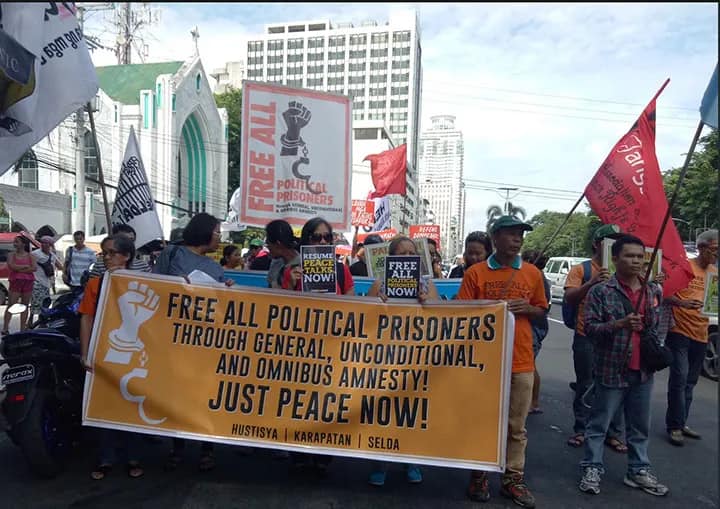The Samahan ng Ex-Detainees Laban sa Detensyon at Aresto (SELDA) welcomes the recent joint statement of the Government of the Republic of the Philippines (GRP) and the National Democratic Front of the Philippines (NDFP) to resume formal peace talks between the two parties.
We strongly encourage the negotiating panels of the GRP and NDFP to reaffirm all previously signed agreements in the peace negotiations such as The Hague Joint Declaration, the Comprehensive Agreement on Respect for Human Rights and International Humanitarian Law (CARHRIHL), and the Joint Agreement on Safety and Immunity Guarantees (JASIG).
As an organization of former political prisoners, SELDA urges the GRP to promptly release all detained NDFP peace consultants, dismiss all fabricated charges against them and ensure their protection under the JASIG. Their arbitrary and illegal arrest and detention violate the Hernandez doctrine and CARHRIHL.
According to Article 6 of the CARHRIHL, the GRP is obligated to adhere to the doctrine established in People vs. Hernandez (99 Phil. 515, July 18, 1956), as further elucidated in People vs. Geronimo (100 Phil. 90, October 13, 1956). The GRP must expeditiously review the cases of all prisoners or detainees who have been charged, detained, or convicted contrary to this doctrine, and must promptly release them. CARHRIHL was signed in 1998 by the GRP and NDFP as the inaugural agreement of the four substantive agenda outlined in The Hague Joint Declaration between the two parties.
At present, there are 791 political prisoners incarcerated in different municipal and city jails and penal facilities all over the country. Twelve of those unjustly detained are peace consultants Frank Fernandez, Leopoldo Caloza, and Eduardo Sarmiento, who were wrongfully convicted and are currently imprisoned at the New Bilibid Prison (NBP) in Muntinlupa.
The vast majority of political prisoners are activists who have dedicated their lives to fighting landlessness among the peasantry, extremely low wages and inhumane working conditions suffered by the workers, inadequate housing, deteriorating social services, soaring prices of basic commodities and services and intensifying political repression and have been criminalized for their advocacies. Thus, their unjust imprisonment is inextricably linked to the very issues driving the armed conflict, which the peace talks aim to address. The release of political prisoners will therefore serve as a concrete indicator of the GRP’s sincerity in addressing the roots of armed conflict and will contribute greatly to creating an atmosphere conducive to dialogue.
Apart from this, there has been a long trail of violent attacks against NDFP consultants, dating back to the first peace talks held in 1987 between the NDFP and the GRP. Aside from those in prison, several other NDFP consultants and staff have been killed extrajudicially or forcibly disappeared. Justice and accountability are in order for these cases if the way is to be cleared for the peace talks to forge ahead.
The resolution of these issues will be a big step in moving the talks forward, bringing the Filipino people a step closer to the peace and justice they aspire for.

